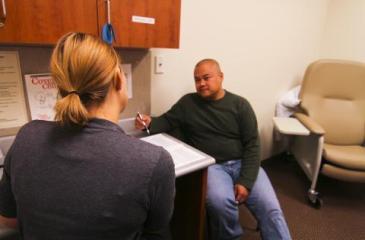*Note: In May 2017, CTSI announced it planned to phase out its Clinical Research Coordinator (CRC) service by year's end.
CTSI recently began implementing its new service model for how it supports clinical and translational research studies across the University with the goal of providing enhanced services that better align with researchers’ needs and familiarity with how the clinical research work is performed.
The new model includes enhancements to the pre-award period -- with emphasis on efficient conduct of study activities once the award or contract has been established
“The new model includes enhancements to the pre-award period -- with emphasis on efficient conduct of study activities once the award or contract has been established,” said Dr. Tim Schacker, CTSI Associate Director.
CTSI’s Clinical Translational Research Services (CTRS) unit began implementing the new model last month with studies utilizing a CTSI Clinical Research Coordinator (CRC) and studies using a CTSI CRC and Research Project Manager (RPM). The new model is expected to be fully operational with current and new studies later this month with minimal impact to PIs during the transition.
CTSI provides outpatient clinical space and equipment and professional research staff for U of M clinical studies.
Researcher and study team feedback from across the Academic Health Center, along with a rapidly-changing regulatory environment, brought about these changes.
Key enhancements
One of the most noticeable changes includes a more visible role for the study coordinator who will now be providing many of the services a research project manager previously administered. The study coordinator will now serve as the central point-of-contact once a feasible protocol has been established.
In addition, three new roles have been developed to optimize the service delivery system to make it easier for investigators to get the support they need. The Clinical Research Advisor, Clinical Research Specialist, and Clinical Research Award Specialist will focus on supporting investigators in the development of feasible protocols, supporting CTSI pilot projects, and connecting researchers with appropriate resources.
“Through these enhancements, CTRS services will be easier to use and will deliver high-impact support to researchers and study teams across the institution,” Schacker said.
If you have feedback or specific questions regarding these changes, please contact Lisa Johnson, CTRS Assistant Director, at 612-624-9159 or [email protected], or Brenda Prich, Clinical Research Implementation Services Manager, at 612-625-2723 or [email protected].
